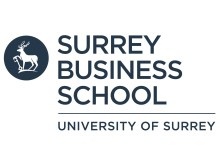
Finance and Accounting
We are active in progressive research in the areas of finance, banking and corporate governance. With a wealth of industry experience at one of the Big Four, the four biggest professional services networks in the world, our academics deliver teaching excellence in the classroom.
Finance and Accounting is a discipline within Surrey Business School.

Our research
We contribute new ideas and fresh thinking to the academic discipline and research community of finance, accounting, banking, economics, and FinTech.
Our staff members
Victoria Milligan
Head of Discipline, Finance and Accounting
After getting a history degree from the School of Slavonic and East European Studies (part of the University of London) I trained and qualified as a chartered accountant with PKF - now merged with BDO - in the audit and assurance department, ending up as a manager. Highlights included auditing a diamond mine in Siberia and a three month secondment to Sydney. My clients were main...

Study with us
Our courses are designed to meet the needs of employers and prepare you for work in the sector, by exploring core elements of accouting and finance.






